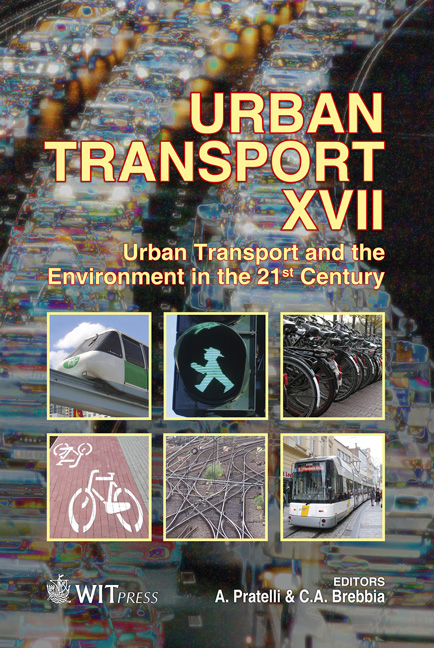An Adaptive Learning Algorithm For A Route Choice Problem In Uncertain Traffic Environments
Price
Free (open access)
Transaction
Volume
116
Pages
10
Page Range
43 - 52
Published
2011
Size
2,989 kb
Paper DOI
10.2495/UT110041
Copyright
WIT Press
Author(s)
T. Miyagi
Abstract
User equilibrium in a congested network has been conventionally formulated using mathematical optimization procedures. These approaches assume drivers’ behaviours with complete information in the sense that each driver knows the other drivers’ behaviours and their payoff functions. If each driver doesn’t know the other drivers’ strategies, he cannot optimize his strategy. In such a situation, an adaptive heuristics may be a relevant approach to get a better solution. To establish behavioural rules of route choice under incomplete information, we use a smooth fictitious play and a regret matching model developed in game theory, and combine these two approaches. We also propose a new algorithm that can be applicable to a complex situation in traffic environments. Keywords: smooth fictitious play, regret-based strategy, ε-Hannan consistency, reinforcement learning. 1 Introduction Consider dynamic environment where drivers choose their routes repeatedly every day. Each driver is equipped with a route guidance system which can be used to collect the information about travel times of routes he would choose by receiving signals from the traffic control centre. Each driver knows his own payoff function, but he does not know those of the other drivers. Moreover, each driver can know in hindsight the vector of payoffs he would have obtained if he had chosen any of his possible actions. We are interested in not only such informed drivers, but also in naïve drivers, who cannot use the route guidance system. Their knowledge about travel is far restricted: a naive driver does not
Keywords
smooth fictitious play, regret-based strategy, ε-Hannan consistency, reinforcement learning





